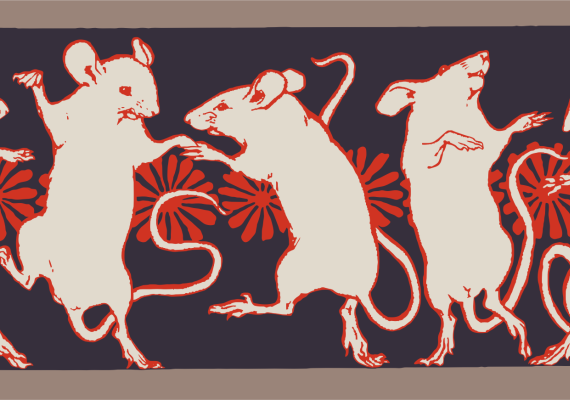Sticking It to the Man
Sam Shuman traces the transformation of a modest ultra-Orthodox rabbi into an emblem of Haredi countercultural resistance

These jolly white mice appear on Plate 29 of the book Dekorative Vorbilder Vol. 12 (1901), by Gerhard Heilmann.
Sam Shuman’s essay Of Mice and Hasidic Men: Reb Shayele as Populist Patron Saint in our latest issue opens new worlds of understanding at the juncture of faith, magic, and Haredi popular culture. The article unveils the remarkable story of an ultra-Orthodox figure known as Reb Shayele (né Yeshaya Steiner in 1851 near the Hungarian-Galician border). Reb Shayele’s renown as a miracle worker in his day has been compounded many times over in his astonishing afterlife, in which he has emerged as a beloved talismanic figure who provides protection to those who invoke him as the patron saint of hospitality. Indeed, the hospitality for which Reb Shayele became legendary is, in Shuman’s reading, not merely a gesture of welcome. The invocation of Reb Shayele conjures up a web of protection for those who seek his favor, prompting Shuman to describe the gentle and modest rabbi, with a trace of irony, as a sort of Mafia don. They delineate several circles of the powers of the great healer.
Reb Shayele is, first and foremost, known as a protector against an infestation of mice that can afflict one’s home. But his protective powers extend well beyond that scourge. Shuman’s deeply textured essay, rich in ethnographic and textual nuance, excavates other sites of Reb Shayele’s powers. For example, he is also known and invoked in Hasidic circles as a protector against obtrusive police intervention in the communal and business lives of Jews. Or as an acquaintance of Shuman’s revealed to them: “Reb Shayele is the rebbe of the swindlers, of the people who do funny business, you know?” In this regard, the web of protection he provides is replete with political meaning, insofar as Reb Shayele “shields his followers from the consequences of their [the police’s] sovereign authority.” Shuman brings quite remarkable evidence of contemporary Haredim intoning Reb Shayele’s name as they are stopped for speeding violations by state police. Shuman points to the ironic ascendance of a rabbi of modest origins who was not known as a great Torah sage to a position of such power. Reb Shayele is, in that sense, a counter-establishment figure; his very prominence is an implicit critique of the hereditary leadership model in the Hasidic world. Perhaps it is that outsider feature of Reb Shayele that prompts his followers, as Shuman observes, to invoke his name on behalf of Donald Trump, the ultimate counter-establishment figure, as the great savior of the Jewish people.
The range of Reb Shayele’s powers—and of the multiple domains over which he is said to possess powers—offers intriguing insight into the mind-set of a swath of contemporary Haredi men. But it also compels us to reimagine hospitality as a political act—and to regard Reb Shayele as more than a rabbinic magic man. He is, on Shuman’s forceful reading, no less than a conjurer a state of exception from the sovereign powers of the gentile state.


